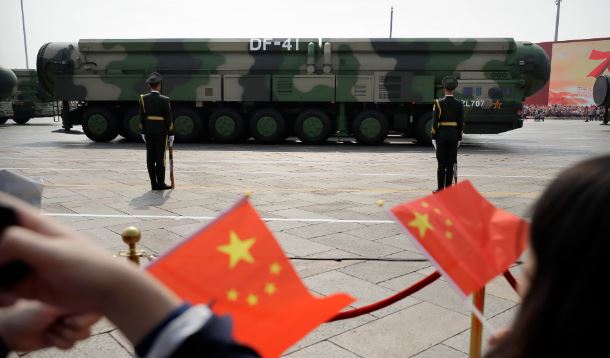Nuclear Capable ICBM Openly Test-Fired into the Pacific Ocean After 44 Years: Routine Training, Says China
China has conducted an ICBM missile test in the Pacific Ocean. Beijing’s decision to test-fire an intercontinental ballistic missile into the Pacific Ocean on Wednesday has raised security concerns in the region, due to its ongoing territorial claims in the South China Sea and its relentless competition with the U.S. A statement posted on social media by the Chinese Defense Ministry indicated that the ICBM, carrying a dummy warhead, was tested in a specific area of the sea.
The People’s Liberation Army’s Rocket Force stated that the ICBM launch into the ocean was part of its routine annual training and was conducted in accordance with international law. The statement emphasized that the missile test was not aimed at any specific country or target.

Although Beijing has upheld a “no first use” nuclear weapons policy for years, experts suggest that the People’s Liberation Army (PLA) is now outpacing major nuclear powers in the development of a wide array of land-, sea-, and air-launched missiles, capable of being fired from various locations.
Department of Defense (U.S.) has issued a measured & guarded statement on this ICBM test, praising the rare, advanced notification from China. U.S. has always criticized China for lack of transparency when it comes to nuclear weapons.
“We did receive some advanced notification of this ICBM test, and we believe that that was a good thing. We will also continue to press for substantive bilateral engagement on issues related the PRC’s nuclear weapons expansion and measures to begin to address the risks driven by the PRC’s buildup”
Pentagon
Japan has said that it has received no prior notification of this ICBM test & termed these kinds of activities a “serious concern”. However, A Japan Coast Guard official reported that China had issued a navigation warning on Monday regarding “space debris” in three areas: the South China Sea, the Pacific Ocean north of the Philippines’ Luzon Island, and the South Pacific, with the warning set to take effect on Wednesday.
Unlike other nations, China rarely launches long-range ICBM missiles into the sea, preferring instead to test them unannounced in remote provinces like Inner Mongolia. Furthermore, this test is surprising, as the last one was conducted decades ago, making this publicly tested ICBM by China a rare event after 44 Years. The launch happened during the ongoing United Nations General Assembly in New York. China is one of the five permanent members of the U.N. Security Council, each with veto power.
As per Pentagon estimates, China has 500 nuclear warheads in its arsenal which includes 350 ICBM Category. It is to be noted, China cancelled nuclear talks with Washington recently in reaction to continued U.S. defense related Support to Taiwan.
Defense officials in Japan and Taiwan chose not to directly respond to China’s announcement of ICBM Test. However, both countries, along with South Korea, have strong defense systems in place to counter potential Chinese actions, including early warning systems and air raid shelters. Taiwan has criticized increased military activities by China including drills, air corridor violations attracting Taiwan to dispatch their own fighter jets to guard the territory.
The ICBM test marks a significant shift in the strategic balance of Asia, as China’s ongoing territorial disputes with Taiwan, the Philippines, Japan and India continue to escalate, along with its growing rivalry with the U.S. Navy patrolling the international waters of the South China Sea. Through its display of advanced missile capabilities, China is strengthening its military might, which could potentially encourage a more aggressive stance in the region.
In addition to raising security concerns, the ICBM test prompts other countries and the U.S. to reassert their defense capabilities. This development could exacerbate the already unstable geopolitical environment in the Indo-Pacific and intensify the rivalry between major powers.

Good Information